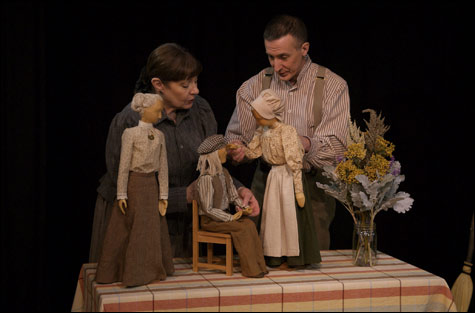
TENDER EVOCATION: M. Marguerite Mathews, Greg Gathers, and a puppet creation. |
The Maine writer Sarah Orne Jewett, born in South Berwick in 1849, memorably focused her work on the ordinary people of rural nineteenth-century Maine. In Dunnet Landing Stories, Pontine Theatre's M. Marguerite Mathews and Greg Gathers present a series of her stories that involve the characters of her classic collection The Country of the Pointed Firs. Using Pontine's signature theatrical elements — hand-carved wooden puppets, cardboard cut-outs of figures and flora, projected photographs — Mathews and Gathers stage a beautiful and poignant homage to Jewett's work.
Pontine presents her stories along the arc of the seasons, summer through spring, and this structure elegantly relates the archetypes that time draws of human relations. In summer's tale, "The Dunnet Shepherdess," for example, the female narrator and the eternal bachelor William visit old Mrs. Hight and her spinster shepherdess daughter, Esther. Over the course of the day, the narrator is astounded to find that she has been blind to a romance — the mythos of summer — that's long been brewing, right under her nose, between the shy, middle-aged shepherdess and bachelor. She ends her day's visits warmed by a new sense of the slow adventures of communion at work among even the most unlikely folks.

"The Dunnet Shepherdess," like many of the five stories presented in this one-act show, involves Mathews and Gathers alternating their characterizations between human and puppet portrayals, a live actor regularly interacting with a wood-hewn one. As in so many of Pontine's productions, the engagement between human and puppet is transcendently tender, and Gathers, particularly, manipulates and speaks for the dolls with marvelous, captivating sensitivity.
In winter's two stories, Mathews and Gathers demonstrate equally arresting skills in dramatic monologue sans puppets. Gathers takes on the persona of an old man (by way of superb physical and accent work) in "The Foreigner," a regretful reminiscence about a French-born woman married to a local sea captain, who never quite fits into Dunnet Landing. And in "Daniel Gunn," Mathews is delightful as a no-nonsense Yankee matron sharing tales of a sea captain who, following a bout of sunstroke, became convinced he was his own dead sister — and dressed accordingly.
Each season is prefaced by Jewett's intricate description of landscape and weather, and accompanied by photographic images projected onto a framed window screen — wildflowers, seashore, right angles of farmhouse window frames and clapboards. Pontine's staging is simple and evocative.
Jewett's stories, likewise, are deceptively simple and sparse of action, and it would be easy to mistake them as pure romanticization. But a closer look reveals not just her affection for these village folk, but her wisdom about the ecology of their relationships — and of the intricacy of human relations writ large. In fall's "The Queen's Twin," the narrator visits an old woman who was born on the same day as Queen Victoria, and who has spent her life obsessing over it. Jewett relates her heart-rending pathos with subtlety and affection, and likewise do Mathews and Gathers bring a great humanity to all the characters of Dunnet Landing.
"Their counterpart is in every village in the world, thank heaven," pronounces the narrator near the end of the play, after spring has come and William and Esther have finally married, "and the gift to oneself is in its discernment." That discernment, rich in wisdom and empathy, is indeed the gift that both Jewett's writing and Pontine's production leave with us.
Megan Grumbling can be reached atmgrumbling@hotmail.com.